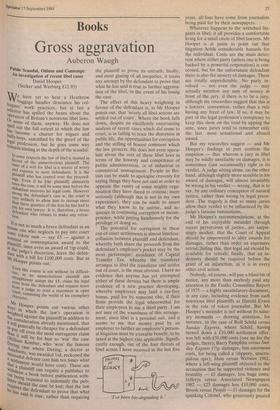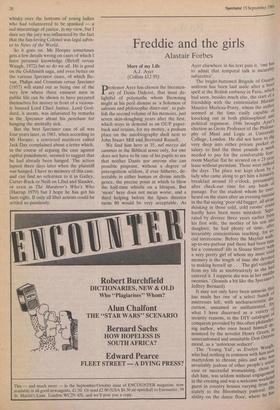Books
Gross aggravation
Auberon Waugh
Public Scandal, Odium and Contempt: An investigation of recent libel cases David Hooper (Seeker and Warburg £12.95)
We have yet to hear a Heathrow baggage handler denounce his col- leagues' work practices, but at last a solicitor has spilled the beans about the operation of Britain's notorious libel laws. Or some of them, anyway. He does not has out the full extent to which the law keas become a charter for rogues and ,utlIIY-boys sanctified by the greed of the legal profession, but he goes some way towards hinting at the depth of the scandal:
In some respects the law of libel is slanted in favour of the unmeritorious plaintiff. The issue of a writ for libel is a source of worry and expense to most defendants. It is the Plaintiff who has control over the proceed- ings. Even if he [the plaintiff] ultimately loses the case,
it will be some time before the defendant recovers his legal costs. However strong the defendant's case is, the court is verY unlikely to allow him to recoup more than three quarters of the fees he has had to PaY his own lawyer. It is, therefore, a brave defendant who refuses to make any retrac- tion.
i„ It is not so much a brave defendant as an ;sane one who neglects to pay into court :_lne token sum — say £5 — against a _nit', Mina' or contemptuous award to the P_taintiff, since even an award of thp could, 4,ta the judge's discretion, leave the defen- dant with a bill for £100,000 costs. But as 'r Hooper points out: .Even this course is not without its difficul- ties, as an unmeritorious plaintiff can e
straightaway accept the £5, claim his legal footss from the defendant and request leave Court, a judge to read a statement in open
urt, reminding the world of his exemplary character.
Mr Hooper points out various other
h"aYs in which the law's operation is eglued against the plaintiff in addition to it Consideration already mentioned, that t will generally be cheaper for a defendant tjt PaY off even the most outrageous claim 4.,11 it will be for him to 'win' the case ridliarn Kimber, who 'won' the famous e -ng ease where Dering, a doctor at Auschwitz • ,vss tul s
s , was awarded 1/2d, reckoned the a11-- defence cost him ten times what
thsettlement would have cost). These are a plaintiff can require a publisher to owulthdraw a book before publication with- ) st!being required to indemnify the pub- reuer should the case be lost; that the law ii,,(lektres the defendant to prove that what has said is true, rather than requiring
the plaintiff to prove its untruth; finally, and most glaring of all inequities, it treats any attempt by the defendant to prove that what he has said is true as further aggrava- tion of the libel, in the event of his losing the case.
The effect of this heavy weighting in favour of the defendant is, as Mr Hooper points out, that 'nearly all libel actions are settled out of court'. Where the book falls down, despite its excellently entertaining analysis of recent cases which did come to court, is in failing to trace the distortion in public life, the opportunities for corruption and the stifling of honest comment which the law protects. He does not even specu- late about the cost of these libel laws in terms of the honesty and competence of public administration, or of industrial or commercial management. People in Bri- tain can be made to apologise cravenly for saying things they have not said in order to appease the vanity of some mighty orga- nisation they have dared to criticise; more seriously (although this is not in my own experience), they can be made to assert what they know to be untrue, and ac- quiesce in continuing corruption or incom- petence, while paying handsomely for the privilege of doing so.
The potential for corruption in these out-of-court settlements is almost limitless: collusion between plaintiff and defendant, whereby both share the proceeds from the defendant's employer's pocket may be the most picturesque; avoidance of Capital Transfer Tax, whereby the transferer arranges to libel the transferee and settles out of court, is the most obvious. I have no evidence that anyone has yet attempted either of these devices but there is ample evidence of a new practice developing, whereby employees may land a tax-free bonus, paid for by someone else, if their firms provide the legal wherewithal for their employees to sue a third party. I am not sure of the soundness of this arrange- ment, since libel is a personal suit, and it seems to me that money paid by an employer to further an employee's person- al litigation must be a taxable benefit, to be taxed at the highest rate applicable. Signifi- cantly enough, out of the four threats of libel action I have received in the last five 'I've been bio-degrading it.' years, all four have come from journalists being paid for by their newspapers.
Whatever happens to the wretched liti- gants in libel, it all provides a comfortable living for a small circle of libel lawyers. Mr Hooper is at pains to point out that litigation holds considerable hazards for the individual. Costs are the main deter- rent where either party (unless one is being backed by a powerful corporation) is con- cerned, but for the unfortunate defendant there is also the anxiety of damages. These are totally unpredictable. No party in- volved — not even the judge — may actually mention any sum of money in front of the jury, if there is to be a jury, although my researches suggest that this is a lawyers' convention, rather than a rule having any force of law. If so, it may be part of the legal profession's conspiracy to keep this show on the road by upping the ante, since juries tend to remember only the last, most sensational and absurd award.
But my researches suggest — and Mr Hooper's findings in part confirm the suspicion — that whereas a jury in libel may be wildly unreliable on damages, it is sometimes (just occasionally) right in its verdict. A judge sitting alone, on the other hand, although slightly more sensible in his award of damages, will almost invariably be wrong in his verdict — wrong, that is to say, by any ordinary conception of natural justice, rather than wrong by legal prece- dent. The tragedy is that so many juries allow their verdict to be influenced by the judge's fatuous ruminations.
Mr Hooper's recommendations, at the end of his enjoyable meander through recent perversions of justice, are surpri- singly modest: that the Court of Appeal should be empowered to alter awards for damages, rather than order an expensive retrial; failing this, that legal aid should be available for retrials; finally, that an in- demnity should be required before the grant of an injunction, as it is in every other civil action.
Nobody, of course, will pay a blind bit of notice, any more than anybody paid any attention to the Faulks Committee Report of 1975 — a highly unsatisfatory document, in any case, including evidence from such notorious libel plaintiffs as Harold Evans in the role of token journalist. But Mr Hooper's meander is not without its salut- ary moments — drawing attention, for instance, to the case of Rolf Schild versus Sunday Express, where Schild, having turned down a £10,000 settlement offer, was left with £50,000 costs (one up for the judges, there); Barry Pamphlin versus Sun- day Express (1/2p damages, less enormous costs, for being called a 'slippery, unscru- pulous spiv); Hain versus Webster 1982, where a left-wing plaintiff objected to the accusation that he supported violence and brutality — £5 damages, less huge costs; Jefferys versus Associated Newspapers 1982 — £25 damages less £10,000 costs; Brook versus People — £1 damages for the spanking Colonel, who generously poured whisky over the bottoms of young ladies who had volunteered to be spanked — a sad miscarriage of justice, in my view, but I dare say the jury was influenced by the fact that the fun-loving Colonel was legal advis- er to News of the World.
So it goes on. Mr Hooper sometimes gets a few details wrong on cases of which I have personal knowledge (Beloff versus Waugh, 1972) but so do we all. He is good on the Goldsmith saga, and even better on the various Spectator cases, of which Be- van, Philips and Crossman versus Spectator (1957) will stand out as being one of the very few where three eminent men in public life can be shown to have perjured themselves for money in front of a vicious- ly biassed Lord Chief Justice. Lord God- dard, it seems, was infuriated by remarks in the Spectator about his penchant for hanging the mentally sick.
But the best Spectator case of all was four years later, in 1961, when according to Mr Hooper, a convicted murderer called Jack Day complained about a letter which, in the course of arguing the case against capital punishment, seemed to suggest that he had already been hanged. The action lapsed three days later when the plaintiff was hanged. I have no memory of this case, and can find no reference to it in Gatley, Carter-Ruck or Neill on Libel and Slander, or even in The Murderer's Who's Who (Harrap 1979) but I hope he has got his facts right. If only all libel actions could be settled so painlessly.



















































 Previous page
Previous page